Tehran, Baku Agree To Build Highway Connecting Two Azerbaijan Regions
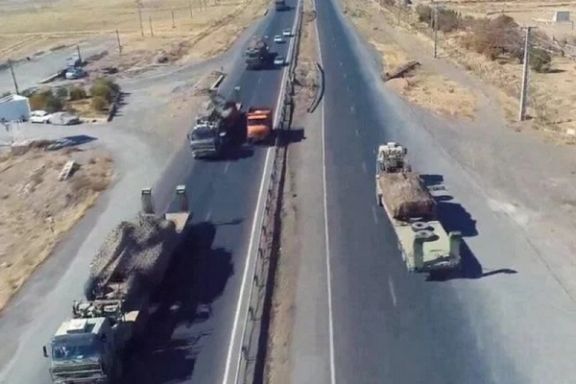
Tehran and Baku have agreed to build a highway to connect Nakhchivan to Azerbaijan ‘s Eastern Zangezur Economic Region through Iran.

Tehran and Baku have agreed to build a highway to connect Nakhchivan to Azerbaijan ‘s Eastern Zangezur Economic Region through Iran.
Iranian Road Minister Rostam Ghasemi and Azerbaijan’s First Deputy Prime Minister Shahin Mustafayev signed the agreement during a meeting with President Ilham Aliyev in attendance in capital Baku on Friday.
The 55-kilometer highway will bypass the territory of Armenia, which is located between Nakhchivan and Azerbaijani region of Kalbajar-Lachin, now named Eastern Zangezur.
The region was in Nagorno-Karabakh that came under the control of Azerbaijan after Yerevan and Baku fought a war over the disputed region in 2020.
This highway will also connect to the International North–South Transport Corridor that is a multi-mode network of ship, rail, and road route for moving freight across India, Iran, Azerbaijan and Russia.
In January, Iran and Azerbaijan signed another dealto construct a bridge on Astarachay River running along the joint border as part of their plans to increase road transit between the two countries.
In a message to President Ebrahim Raisi on the 30th anniversary of the establishment of diplomatic relations between Azerbaijan and Iran Saturday, Aliyev said, “Over the years, numerous reciprocal trips, signed documents and agreements, as well as joint projects have played an important role in the development of our dynamic cooperation in political, economic, transport, energy, cultural and other fields”.

Sweden on March 10 deported back to Iran two alleged Iranian agents who were arrested for links to a terrorist plot, instead of putting them on trial.
According to documents seen by Iran International, the real identity of the two suspects were Fereshteh Sanai-Fari (female) and Mehdi Ramezani (male), who had entered Sweden with fake names of Salma Khormai and Javad Malekshahi, respectively.
The two, who entered Sweden in 2015 as refugees during the great refugee flood to Europe, without any documents, had claimed they were from Afghanistan and lied about their age.
Sweden’s security agencies arrested the female and male suspects in April 2021, but never revealed details of their offenses. The only crime publicly known is their false claims during their refugee hearings and alleged “conspiracy to commit a criminal terrorist act.”
According to a report by IranWire, Sweden's Deputy Chief Prosecutor Hans Ihrman said on Thursday that the two have been repatriated to Iran because the prosecutor’s office hadn’t received the needed documents from security agencies to charge them.
The United States also wanted the suspects but according to Ihrman, the request to extradite the two had not arrived in time before their deportation back to Iran.
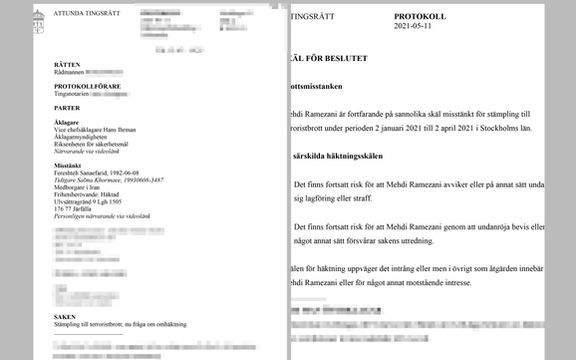
IranWire cited an unnamed source as saying that "It seems that the security police did not provide all the information and documents to the prosecutor, who could not indict them without material evidence. The only option the prosecutor had was to request the dismissal [of the case]."
The Swedish Security Service said they had travelled to Europe as a terrorism sleeper cell, saying they were believed to be agents for the Islamic Republic who sought to execute a terrorist act against Iranian dissidents, apparently American citizens, but didn’t disclose the targets’ names.
Finland-based journalist Kambiz Ghafouri told Iran International that Sweden probably deported them because it is already too busy with trials of similar cases such as Hamid Noury (Nouri) and Kia brothers for their past crimes or links with Iranian intelligence and doesn’t want more tensions in its relations with Tehran.
Sweden is entagled in another Iran-related case. Ghafouri said the Islamic Republic has tied the fate of Iranian-Swedish doctor Ahmadreza Djalali (Jalali) -- who was arrested in 2016 by Iranian intelligence on vague charges of spying and was sentenced to death on October 21, 2017 --to the extradition of Iranian diplomat Asadollah Asadi – who was arrested in 2018 for the attempted bombing of an assembly of the Mujahedin-e Khalq (MEK) opposition group near Paris.
There is also the case of Stephen Kevin Gilbert and Simon Kasper Brown, two Swedish nationals charged with drug trafficking in Iran that the Islamic Republic wants to use in a prisoner swap to get Nouri.
Nouri was arrested in November 2019 while visiting Sweden and charged with war crimes for his role in the execution of up to 5,000 political prisoners in Iran serving jail time in 1988.
Peyman Kia, now 41 years old and a former head of Swedish security police, and his brother Payam were arrested late in 2021 in Sweden and are facing espionage charges.
Sweden has a large Iranian community made of former and current refugees, among them many anti-regime activists and human rights advocates.
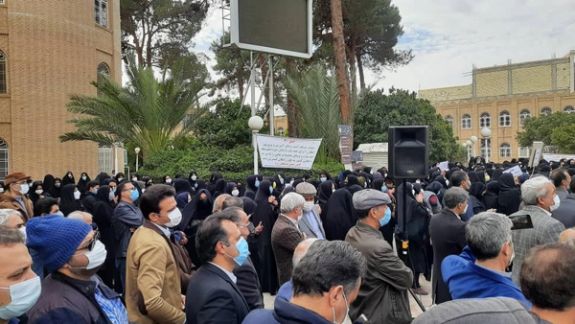
Security forces in northern Iran on Saturday used force to disperse teachers who attempted to rally in support of a colleague, according to social media posts.
Teachers in Gilan province had planned a rally Saturday in front of the department of education in Roudsar to show support for colleague Aziz Ghasemzadeh, whose trial began on Saturday.
Ghasemzadeh, spokesman for the Coordination Council of Iranian Teachers’ Trade Associations in Gilan province, was arrested at his home in Roudsar September 26 after organizing teachers' protests calling for higher wages.
He was released on bail after two weeks during which he claimed he had no access to a lawyer or his family. The Coordination Council said security forces prevented Ghasemzadeh's family from accompanying him to court on Saturday, confiscated his brother's mobile phone, and arrested a relative outside the court.
Social media has as yet no videos of these events, possibly due to internet disruption. But in an audio recording released by the Telegram social-media channel of the Coordination Council of Iranian Teachers’ Trade Associations, a female teacher claimed she and other teachers had been beaten by security forces, including by female officers, outside the education department.
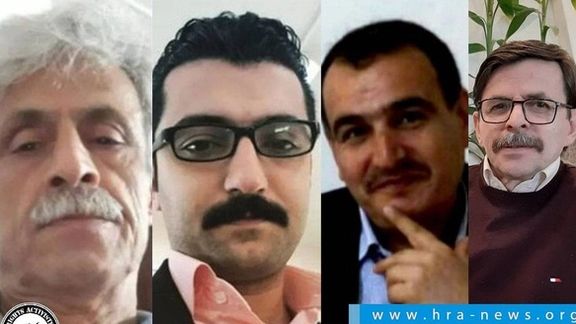
She said the police had used profanities and accused the teachers of being involved in a sedition to overthrow the regime.
Other social media users said security forces stationed in front of the education department had dispersed any groups approaching the area. They also said police reportedly blocked roads leading to Roudsar to block supporters from other areas of the province. According to social media reports, at least five teachers were arrested by security forces in Roudsar.
Teachers across Iran have staged several nationwide protests and strikes in the past six months and have vowed to continue protests until authorities meet their demands including fair wages and freedom of other colleagues who have been imprisoned for their trade union activities.
Following protests across Iran in December, the executive board of Education International, the Brussels-based federation of trade unions of teachers and education workers,in a resolution demanded respect for the "rights of teachers and education workers to organize and to freedom of association and freedom of speech including the right to peaceful assembly, without fear of intervention by the authorities" as well as “institutionalizing dialogue” with teachers' representative organizations.
With consumer price inflation at 40 percent in 2021, and food prices rising faster, after four years of United States ‘maximum pressure’ sanctions, various Iranian workers have held protest rallies or strikes to demand higher salaries.
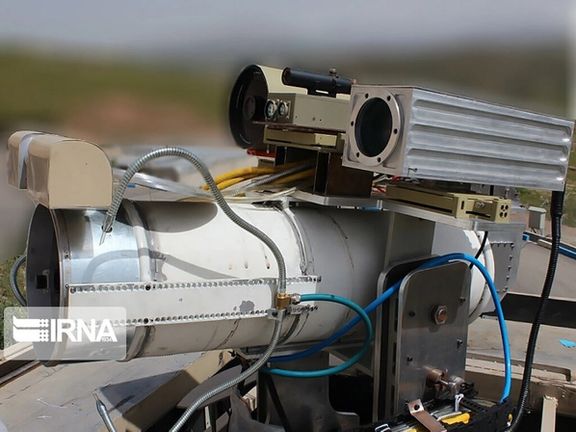
Iran claims it has produced a laser weapon, saying the Islamic Republic is now among the few countries in the world that can build such weapons.
According to an IRNA report on Saturday, the laser cannon, named ‘Sateb’, can shoot down aerial targets by laser beams and is used by the country's defense units “to protect sensitive places.”
The report said the know-how for design and production of laser defense systems is one of the most important achievements of the country’s military industry in recent years.
In September 2019, Electronic Industries Organization of Iran announced it has succeeded to acquire the knowledge for the laser weapons technology, saying its laser weapons can destroy radar evading UAVs that are made up of composite layers.
Although Iran wants to highlight its laser weapon capabilities to target drones and cruise missiles, the directed-energy weapons including lasers are still at their experimental stage, and are not seen as practical, high-performance military weapons, because a laser generates a beam of light which needs clear air, or a vacuum, to work.
The US-Israeli project for such a weapon was canceled in 2005because of "its bulkiness, high costs and poor anticipated results on the battlefield".
The Islamic Republic is known to claim production of high-tech weapons as a show deterrence.
At the early months of the coronavirus pandemic the IRGC unveiled Mosta'an 110, a simple-looking device that it said was capable of detecting the virus from 100 meters. The episode turned into public ridicule.
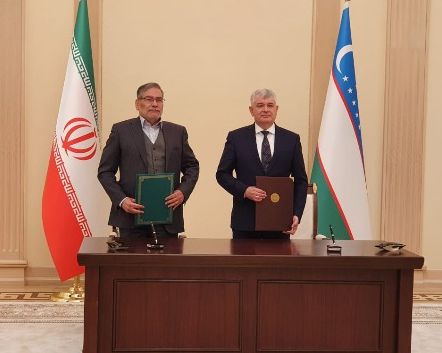
Iran and Uzbekistan have signed an agreement to increase joint security and intelligence cooperation between the two countries.
The document was signed by the secretary of Iran’s Supreme National Security Council, Ali Shamkhani, and his Uzbek counterpart Viktor Makhmudov in the capital Tashkent on Wednesday.
According to the agreement, a Joint Security Commission will be established and held annually to follow up on the bilateral cooperation.
Shamkhani said Uzbekistan has a very important geopolitical position in the heart of Central Asia, noting, "Issues such as preventing the spread of terrorism and extremism in the region are among the common security concerns of the two countries”.
He added that “the common borders of Iran and Uzbekistan with Afghanistan require increased cooperation to resolve problems and establish peace and stability in this country".
During his visit to Uzbekistan, Shamkhani also held a meeting with President Shavkat Mirziyoyev, where the two stressed the necessity for communication between the security institutions of the two countries and called for increasing the level of trade and economic ties.
Shamkhani also appreciated Uzbekistan’s support for Iran's membership in the Shanghai Cooperation Organization and expressed hope that this support would continue until the Islamic Republic’s membership is finalized.

President Vladimir Putin has approved deploying up to 16,000 volunteers from the Middle East to fight alongside Russian forces in the invasion of Ukraine.
As Russian troops continue their offensive toward the Ukrainian capital Kyiv from the northwest and east for more than two weeks, Putin on Friday gave the go-ahead to enlist battle-hardened forces from conflicts such as in Syria on Friday.
"If you see that there are these people who want of their own accord, not for money, to come to help the people living in Donbass, then we need to give them what they want and help them get to the conflict zone," Putin said at a televised security council meeting from the Kremlin.
Reports began emerging earlier this week that Russia wanted to recruit fighters in Syria, with the clear danger of Iran-backed forces and other militants going to Europe to fight.
"As to the delivery of arms, especially Western-made ones which have fallen into the hands of the Russian army - of course I support the possibility of giving these to the military units of the Lugansk and Donetsk people's republics," Putin added.
During the meeting, Defense Minister Sergei Shoigu proposed that Western-made Javelin and Stinger missiles that were captured by the Russian army in Ukraine should be handed over to Donbass forces.
Responding in a video message, Ukrainian President Volodymyr Zelensky said "thugs from Syria" would be coming to kill people "in a foreign land".